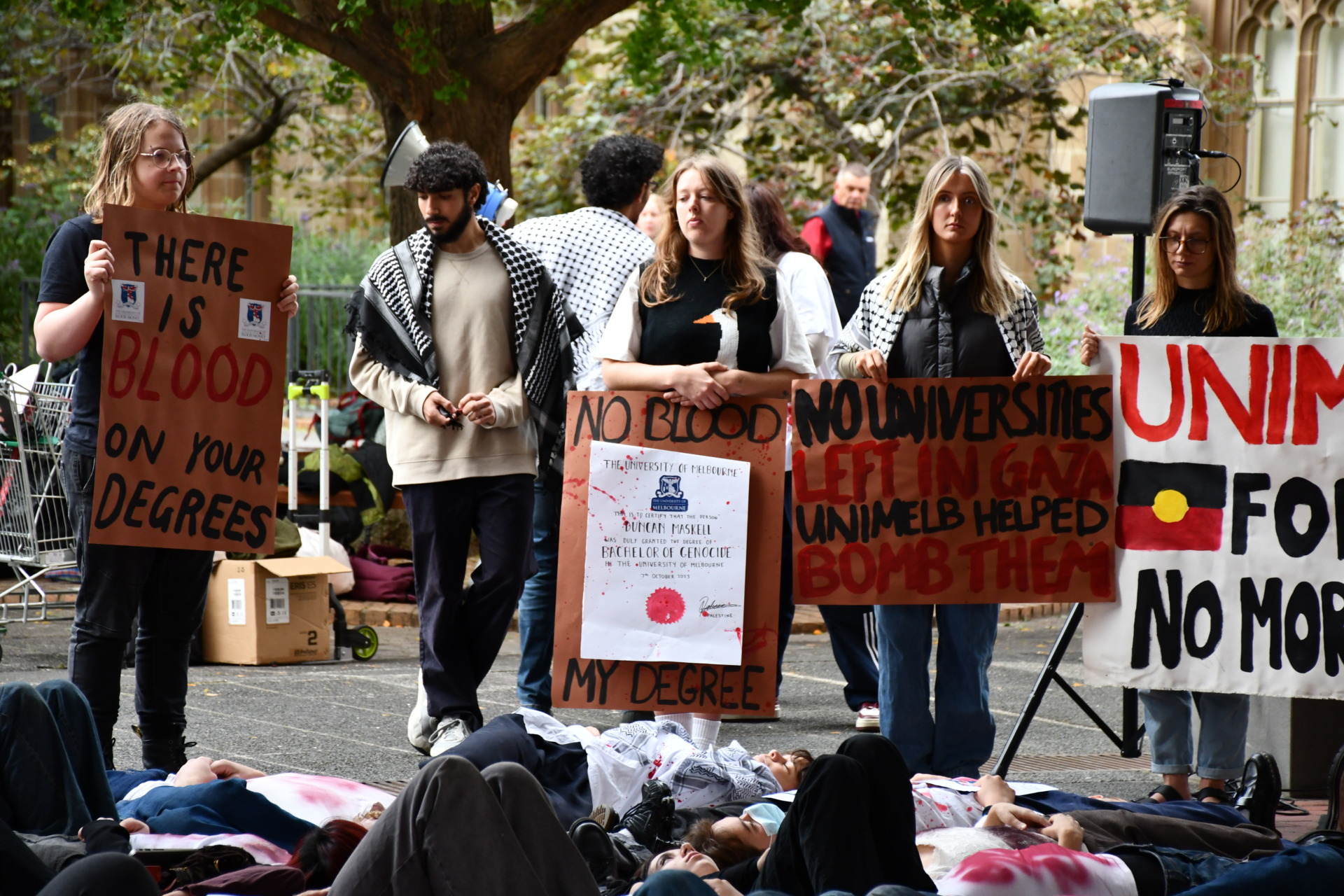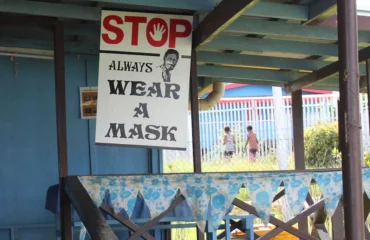About 90 “Unimelb for Palestine” activists peacefully protesting the University of Melbourne’s ongoing relationships with weapons manufacturers staged a “die-in” outside the office of vice chancellor Professor Duncan Maskell on Tuesday.
Wearing white shirts stained with red paint, the protesters – who describe themselves as a “non-affiliated, grassroots collective … of students, staff and alumni” – called on the university to cut its ties with weapons manufacturers Boeing, BAE Systems and Lockheed Martin.
Speaker Dana Alshaer accused the university of “complicity … in the genocide that’s taking place in Gaza right now” by participating in research that could be used to “develop weapons and fighter jets that will be used against the Palestinans in Gaza”. A spokesperson for the university said it “strongly rejects the protesters’ claim”.
The use of the term “genocide” remains fiercely contested. In Geneva on Tuesday, UN special rapporteur Francesca Albanese presented a report arguing that she believed Israel had committed “acts of genocide”, which Israel immediately dismissed as “an outrageous distortion of the Genocide Convention”.
“As students, we have a right and we have a say in what this university does,” said Alshaer, a master of international relations student born and raised in the occupied West Bank.
“They’ve taken our money, so we have a right to tell them to cut these ties.”
Tuesday’s “die-in” continued an ongoing campaign by Unimelb for Palestine organisers, including Alshaer and Hiba Adam, a law student and former president of the university’s student union.

The university was attempting to “jargon-ise and use euphemisms” to obfuscate its involvement with weapons manufacturers, protesters said. Photo: James Costa
The Israel-Hamas war has stirred similar action on university campuses nationally and internationally, often protesting ties with arms manufacturers. On 19 March, students from the University of Queensland protested to disrupt an “industry masterclass” held on campus and presented by Northrup Grumman, a US-based defence technology and aerospace corporation.
In a widely circulated video from 2023, Alshaer confronted Maskell on the University of Melbourne campus, following him to his office and asking him questions about the university’s partnerships with weapons manufacturers. The vice chancellor largely deflected the questions. When Alshaer asserted that as vice chancellor, he had a responsibility to answer questions from students, Maskell replied: “You can’t tell me what to do, I don’t think”.
The university said its relationship with Lockheed Martin and other weapons manufacturers were a matter of public record. In December 2023, it updated a 2016 statement on the controversial arrangement with Lockheed Martin, stressing that claims it represented a $13 million partnership with the weapons company were incorrect.
“There has never been a $13 million agreement between the University of Melbourne and Lockheed Martin,” it said. The figure refers to the company’s own investment in its Melbourne laboratory. “Since 2016, the University of Melbourne has received $3.5m in funding from Lockheed Martin Australia to support PhD scholarships and research projects in areas such as artificial intelligence/machine learning, resource allocation and optimisation, and quantum sensing.”
In 2021, senior academics told The Guardian that the World Health Organisation had serious ethical reservations about collaborating with research institutes linked to the university because of its ties to Lockheed Martin.
One of the speakers at the die-in, who asked not to be named, told The Citizen that the amount was not the concern. “Three million from a company like Lockheed Martin, whose main profits come from war profiteering… is $3 million too much.”
The university was attempting to “jargon-ise and use euphemisms” to obfuscate its involvement with weapons manufacturers, they said, referencing one program the university has with BAE Systems, a London-based aerospace, defence and information security company, as an “industrial project”.
On its website, the university said that the BAE Systems project would “exploit advanced [artificial intelligence] techniques to deliver a next-level trusted autonomous platform capable of robust and persistent operation in complex, contested land environments”.
Protesters claimed that at a meeting with them last year a senior university figure said the university had an ethics list of industries that it refused to do business with, including tobacco and gambling. They argued that weapons manufacturers should also be on that list.
The university did not respond directly to questions about this claim. A spokesperson said “all research within our institution is subject to Australian law. It is also compliant with and approved under the relevant research ethics and integrity codes and is reviewed by the University of Melbourne Research Due Diligence Advisory Group.”
As part of its ‘Smoke-Free and Tobacco-Free Campuses Policy” the university said it “does not invest directly in companies directly involved in the tobacco industry” nor does it “accept funding from the tobacco industry for any purpose”. Further, it won’t “hire any of its venues or spaces to the tobacco industry or for any event that promotes the use of tobacco. The university maintains income streams that are free from the influence of tobacco industry funding”.
Since students returned to campus for first semester in late February, there have been numerous smaller actions and gatherings by students supporting Palestine, sometimes in proximity to weekly lunch meetings of the Jewish Students Society. The Citizen has observed several of these events, and spoken to a cross section of people attending.
While there are palpable tensions around Israel-Hamas war on campus, and a lot of activity around the posting and removal of signs and slogans, interactions at these gatherings have appeared peaceful. Asked for a response to claims and actions at Tuesday’s “die-in”, the Jewish society did not respond.
The protest started with 15 minutes of sirens, but ended it on a quieter note. Speakers took 15 minutes to read out a list of 5000 names, some of the 13,000 children UNICEF says have been killed in Gaza since 7 October 2023, when heavily armed Hamas militants launched an attack on sites in southern Israel, and killed about 1200 people and took 253 hostages.

‘UnimelbforPalestine’ organisers Mohamed Omer (left) and Dana Alshaer (right) addressing protesters on Tuesday. Photo: James Costa


